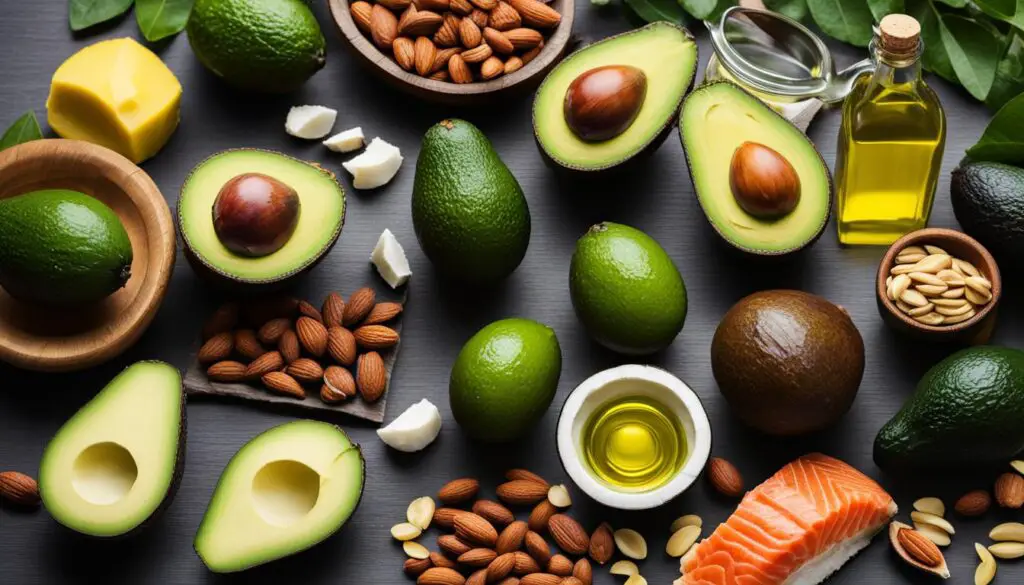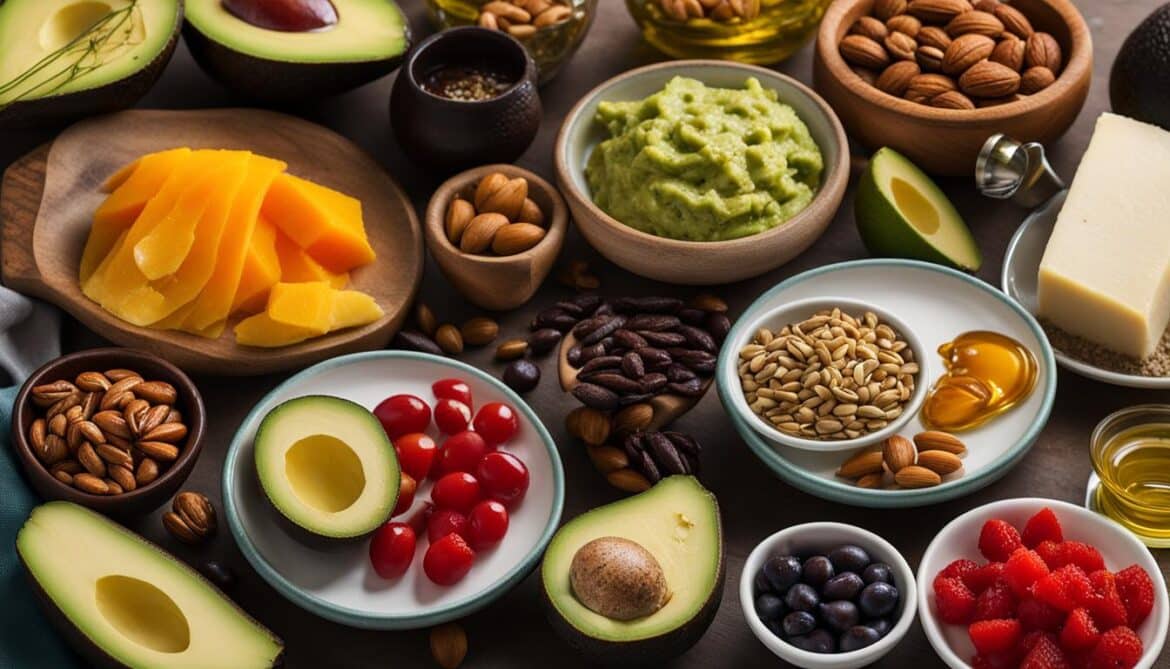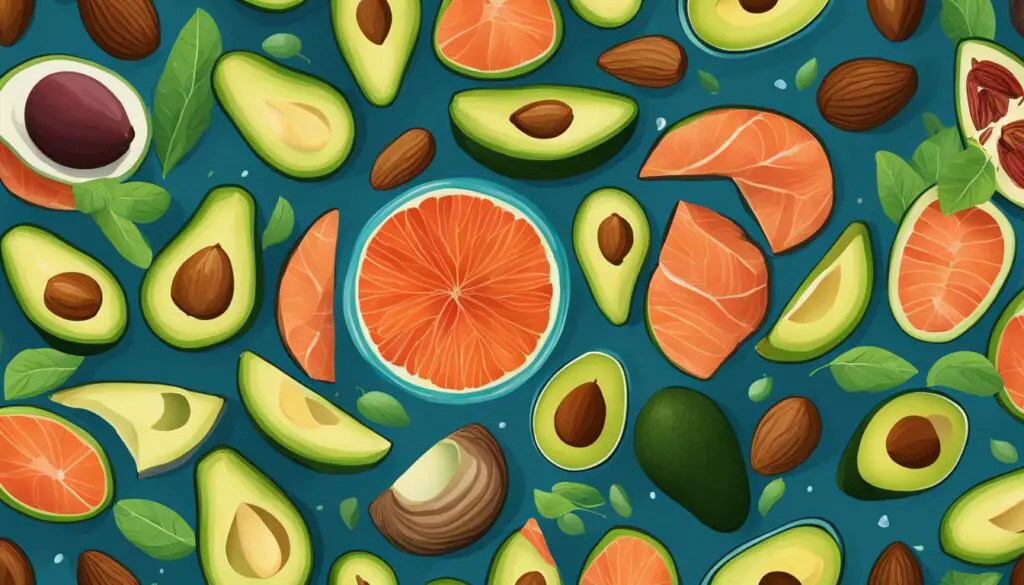When it comes to our diet, we often associate fats with negative connotations, believing that they only contribute to weight gain and poor health. However, not all fats are created equal, and there is a category of fats that can actually benefit our overall well-being.
These are the healthy fats. They not only play a crucial role in weight management but also provide numerous health benefits that support our brain, heart, and immune system.
In this article, I will explore the power of healthy fats and how they can aid in weight loss while improving our overall health. Understanding the types of healthy fats, their benefits, and the best sources to incorporate into our diet will empower us to make informed choices that promote a balanced lifestyle.
Key Takeaways:
- Healthy fats are not detrimental to our health; they can actually aid in weight loss and promote overall health.
- Incorporating healthy fats into our diet supports brain health, heart health, hormone production, and absorption of fat-soluble vitamins.
- Monounsaturated fats, polyunsaturated fats (omega-3 and omega-6), and saturated fats have different roles and should be consumed in moderation.
- Avocados, olive oil, fatty fish, nuts, and seeds are excellent sources of healthy fats that can be included in our meals.
- Creating a balance in fat intake, prioritizing healthier options, and portion control are essential for successful weight loss.
The Benefits of Healthy Fats
When it comes to weight loss and overall health, incorporating healthy fats into your diet can have numerous benefits. These fats provide satiety, helping to control appetite and prevent overeating. By including healthy fats in your meals, you can feel more satisfied and avoid unnecessary snacking.
But the advantages of healthy fats extend beyond appetite control. The brain, for instance, is composed primarily of fat and requires adequate amounts for optimal functioning. By consuming healthy fats, you support brain health and cognitive function.
In addition, healthy fats play a key role in hormone production and regulation. They help your body create and balance hormones, which have a significant impact on various bodily processes.
Furthermore, healthy fats aid in the absorption of fat-soluble vitamins, such as vitamins A, D, E, and K. These vitamins are essential for numerous functions in the body, ranging from immune health to bone strength.
Moreover, healthy fats possess anti-inflammatory properties. Chronic inflammation is associated with various health issues, including heart disease, diabetes, and certain types of cancer. By including healthy fats in your diet, you can help combat inflammation and reduce the risk of developing these chronic diseases.
To summarize, here are the key benefits of healthy fats:
- Satiety and appetite control
- Support for brain health and cognitive function
- Hormone production and regulation
- Enhanced absorption of fat-soluble vitamins
- Anti-inflammatory properties
By understanding and appreciating these benefits, you can make informed choices when it comes to including healthy fats in your diet.
| Benefits | Description |
|---|---|
| Satiety and appetite control | Healthy fats provide a feeling of fullness, reducing the likelihood of overeating or snacking. |
| Brain health | The brain requires fat for proper functioning and cognitive health. |
| Hormone production | Healthy fats play a role in the production and regulation of hormones. |
| Absorption of fat-soluble vitamins | Fats help the body absorb essential fat-soluble vitamins, which are crucial for various bodily functions. |
| Anti-inflammatory properties | Healthy fats have anti-inflammatory effects, potentially reducing the risk of chronic diseases. |
As you can see, healthy fats offer a range of advantages for your weight loss journey and overall health. By incorporating these fats into a balanced diet, you can enjoy the benefits of increased satiety, improved brain function, hormonal balance, better vitamin absorption, and reduced inflammation. Embrace the power of healthy fats to unlock a healthier, happier you.
Types of Healthy Fats
Incorporating different types of healthy fats into your diet is essential for overall health and well-being. Let’s explore the various types of healthy fats and their benefits:
Monounsaturated fats
Monounsaturated fats are heart-healthy fats that can help lower bad cholesterol levels and reduce the risk of heart disease. Foods rich in monounsaturated fats include:
- Avocados
- Olive oil
- Almonds
- Peanut butter
Polyunsaturated fats
Polyunsaturated fats are essential fats that our bodies need for proper functioning. They have anti-inflammatory properties and support brain health. There are two main types of polyunsaturated fats:
- Omega-3 fatty acids: Found in fatty fish, chia seeds, and walnuts. Omega-3s are known for their heart-healthy benefits and their role in brain health.
- Omega-6 fatty acids: Found in vegetable oils (such as soybean oil and corn oil) and seeds (such as sunflower seeds and pumpkin seeds). Omega-6s are important for brain function and growth.
Saturated fats
Saturated fats should be consumed in moderation as they can raise bad cholesterol levels and increase the risk of heart disease. However, not all saturated fats are created equal. Some sources of saturated fats are healthier than others. Foods that contain saturated fats include:
- Coconut oil
- Dark chocolate
- Full-fat dairy products (such as butter, cheese, and whole milk)
Summary:
Incorporating a variety of healthy fats into your diet is important for maintaining optimal health. Sources of healthy fats include avocados, olive oil, fatty fish, nuts, seeds, and dairy products. Remember to consume saturated fats in moderation and prioritize monounsaturated and polyunsaturated fats for heart health and overall well-being.

| Fat Type | Examples |
|---|---|
| Monounsaturated fats | Avocados, Olive oil, Almonds, Peanut butter |
| Polyunsaturated fats (Omega-3) | Fatty fish, Chia seeds, Walnuts |
| Polyunsaturated fats (Omega-6) | Vegetable oils (such as soybean oil and corn oil), Seeds (such as sunflower seeds and pumpkin seeds) |
| Saturated fats | Coconut oil, Dark chocolate, Full-fat dairy products (such as butter, cheese, and whole milk) |
Sources of Healthy Fats
Incorporating a variety of sources of healthy fats into your diet is important for maintaining overall health and well-being. By including these sources in your meals, you can reap the benefits of their nutritional value and improve the balance of your diet.
Avocados
Avocados are a delicious and versatile source of healthy fats. They are rich in monounsaturated fats, which can help lower bad cholesterol levels and reduce the risk of heart disease. Avocados can be enjoyed on their own, mashed and spread on toast, or used as a creamy addition to salads and sandwiches.
Olive Oil
Olive oil is not only a staple in Mediterranean cuisine but also a great source of healthy fats. It can be used for cooking and dressing, adding a rich and flavorful taste to your meals. Extra virgin olive oil is particularly high in monounsaturated fats and antioxidants, making it a heart-healthy choice.
Fatty Fish
Fatty fish, such as salmon, mackerel, and sardines, are rich in omega-3 fatty acids. These essential fats have been linked to numerous health benefits, including reduced inflammation, improved brain function, and a lower risk of heart disease. Including fatty fish in your diet a few times a week can provide you with a good dose of omega-3s.
Nuts and Seeds
Nuts and seeds are not only a great source of healthy fats but also provide a wide range of essential nutrients. Almonds, chia seeds, and flaxseeds are particularly high in healthy fats, fiber, and antioxidants. They can be enjoyed as a snack or added to your meals to add a satisfying crunch and boost nutrient intake.
Coconut Oil
Coconut oil has gained popularity in recent years due to its unique composition of medium-chain triglycerides. While it is high in saturated fat, these types of fats are metabolized differently by the body. Coconut oil can be used as an alternative cooking oil for sautéing, baking, and even in coffee for a creamy twist.
Full-Fat Dairy Products
Full-fat dairy products, such as yogurt and cheese, can be included in moderation as sources of healthy fats. They provide a creamy and satisfying texture while delivering essential nutrients like calcium and vitamin D. Choosing high-quality, organic options can further enhance the nutritional value of these dairy products.
Incorporating these sources of healthy fats into your diet can contribute to a well-rounded and nutritious eating plan. Remember to practice portion control and balance your fat intake with other macronutrients to support your overall health and wellness.
“Incorporating a variety of sources of healthy fats into your diet can help improve overall health and wellbeing.” – Dr. Jane Harper, Registered Dietitian
Including Healthy Fats in Your Meals
Making simple changes to your meals can help incorporate healthy fats. By including a variety of sources of healthy fats, you can enhance the nutritional profile of your meals and enjoy their numerous benefits. Here are some easy ways to include healthy fats in your daily meals:
1. Avocado
Add avocado slices to your salads or sandwiches. Avocado is a rich source of monounsaturated fats, which can help lower bad cholesterol levels and reduce the risk of heart disease. It also provides a creamy texture and delicious flavor to your dishes.
2. Olive Oil
Drizzle olive oil over roasted vegetables or use it as a base for homemade salad dressings. Olive oil is high in monounsaturated fats and has anti-inflammatory properties. It adds a rich flavor to your meals while providing numerous health benefits.
3. Fatty Fish
Include fatty fish, such as salmon, mackerel, or sardines, in your weekly meal plan. Fatty fish are an excellent source of omega-3 fatty acids, which have been shown to support brain health, reduce inflammation, and improve heart health. Aim for at least two servings of fatty fish per week.
4. Nuts and Seeds
Snack on nuts and seeds throughout the day or add them to your meals. Almonds, walnuts, chia seeds, and flaxseeds are all great sources of healthy fats. They also provide essential nutrients like fiber, vitamins, and minerals.
5. Coconut Oil
Use coconut oil in baking or stir-frying. Coconut oil is rich in medium-chain triglycerides (MCTs), which are a type of saturated fat that can be metabolized quickly for energy. It adds a pleasant flavor to your dishes and is a great alternative to other cooking oils.
6. Full-Fat Dairy Products
Choose full-fat dairy products as part of a balanced diet. Full-fat yogurt, cheese, and milk can provide healthy fats and essential nutrients like calcium and vitamin D. However, consume them in moderation, as they are also higher in calories compared to low-fat or fat-free options.
By being mindful of your fat choices and incorporating these sources of healthy fats into your meals, you can enjoy delicious and nutritious dishes while supporting your overall health.
| Foods | Type of Healthy Fat |
|---|---|
| Avocado | Monounsaturated fats |
| Olive oil | Monounsaturated fats |
| Fatty fish (salmon, mackerel) | Omega-3 fatty acids |
| Nuts and seeds (almonds, chia seeds, flaxseeds) | Polyunsaturated fats |
| Coconut oil | Saturated fats (medium-chain triglycerides) |
| Full-fat dairy products (yogurt, cheese) | Saturated fats |
Balancing Fat Intake for Weight Loss
When it comes to weight loss, it’s crucial to find a balance in your fat intake. While healthy fats offer numerous benefits, they are also calorie-dense, meaning that consuming them in excess can hinder your weight loss progress. To optimize your fat intake and achieve your weight loss goals, consider the following strategies:
- Portion control: Keep in mind that fats contain more calories per gram compared to proteins and carbohydrates. Be mindful of your portion sizes and avoid overindulging in high-fat foods.
- Moderation is key: Aim to consume fats in moderation, ensuring that they are a part of a well-balanced diet. Prioritize healthier sources of fats, such as monounsaturated and polyunsaturated fats, over saturated fats.
- Incorporate variety: Include a diverse range of nutritious foods in your diet to obtain a variety of fats. This will not only enhance your overall nutrient intake but also provide a wider range of health benefits.
- Focus on calorie intake: While fat intake is important, it’s crucial to focus on your overall calorie consumption. To achieve weight loss, you need to create a calorie deficit. Ensure that your daily calorie intake is appropriate for your weight loss goals.
- Listen to your body: Pay attention to your body’s hunger and fullness cues. This will help guide your fat intake and prevent overeating. Eating mindfully and honoring your body’s signals is key to maintaining a balanced and healthy relationship with food.
By following these strategies, you can strike a balance in your fat intake, supporting your weight loss journey while still enjoying the benefits of healthy fats.
Incorporate Mindful Fat Choices
To enhance your weight loss efforts, make mindful choices when it comes to fats. Opt for healthier sources of fats, such as:
- Avocados: Rich in monounsaturated fats, avocados not only provide a creamy texture to your meals but also offer various health benefits.
- Olive oil: Whether used for cooking or dressing, olive oil is a healthy fat option that can add flavor and beneficial nutrients to your dishes.
- Fatty fish: Incorporate omega-3 rich fish like salmon and mackerel into your diet to obtain essential fatty acids and support brain health.
- Nuts and seeds: Almonds, chia seeds, and flaxseeds are great sources of healthy fats and can be enjoyed as snacks or topping for salads and yogurt.
- Coconut oil: Use coconut oil sparingly as an alternative cooking oil to add a tropical flavor to your dishes.
- Full-fat dairy: Including moderate amounts of full-fat dairy products like yogurt and cheese can provide not only healthy fats but also essential nutrients like calcium.
By incorporating these mindful fat choices into your diet, you can enjoy the benefits of healthy fats while staying on track with your weight loss goals.
Conclusion
Incorporating healthy fats into your diet can be a game-changer for weight loss and overall health. These fats not only provide satiety, helping you feel fuller for longer and controlling your appetite, but they also support brain health and have a multitude of other benefits. By adding sources of healthy fats, such as avocados, olive oil, fatty fish, nuts, and seeds, to your meals, you can boost the nutritional value and flavor.
It is crucial, however, to maintain a balance in your fat intake and prioritize healthier options. While healthy fats are beneficial, they are calorie-dense, so portion control is key. Focus on consuming monounsaturated and polyunsaturated fats, which are known as the good fats, while limiting saturated fats. Incorporating a variety of nutrient-rich foods into your diet and being mindful of your overall calorie intake can help you achieve weight loss goals.
As you embark on your journey to a healthier lifestyle, remember that incorporating healthy fats is just one piece of the puzzle. Be sure to follow a well-rounded diet that includes a variety of whole foods, exercise regularly, and prioritize self-care. By making mindful choices and embracing a holistic approach, you can harness the power of healthy fats to improve your well-being and achieve long-lasting weight loss.
FAQ
What are the benefits of healthy fats?
Healthy fats provide satiety, support brain health, play a role in hormone production, help absorb fat-soluble vitamins, and have anti-inflammatory properties.
What are the types of healthy fats?
The types of healthy fats include monounsaturated fats, polyunsaturated fats (including omega-3 and omega-6 fatty acids), and saturated fats.
What are the sources of healthy fats?
Sources of healthy fats include avocados, olive oil, fatty fish, nuts, seeds, coconut oil, and full-fat dairy products.
How can I include healthy fats in my meals?
You can include healthy fats in your meals by adding avocado slices to salads or sandwiches, using olive oil in cooking and dressing, incorporating fatty fish into your meal plans, snacking on nuts and seeds, using coconut oil in baking or stir-frying, and including full-fat dairy products in moderation.
How do I balance fat intake for weight loss?
It is important to consume fats in moderation and prioritize monounsaturated and polyunsaturated fats over saturated fats. Balancing fat intake can be achieved by incorporating a variety of nutritious foods into your diet and focusing on overall calorie intake to create a calorie deficit for weight loss.
How can healthy fats contribute to weight loss and overall health?
Healthy fats can contribute to weight loss and overall health by providing satiety, supporting brain health, and offering various other benefits. By incorporating sources of healthy fats into your meals, you can enhance the nutritional quality of your diet.


